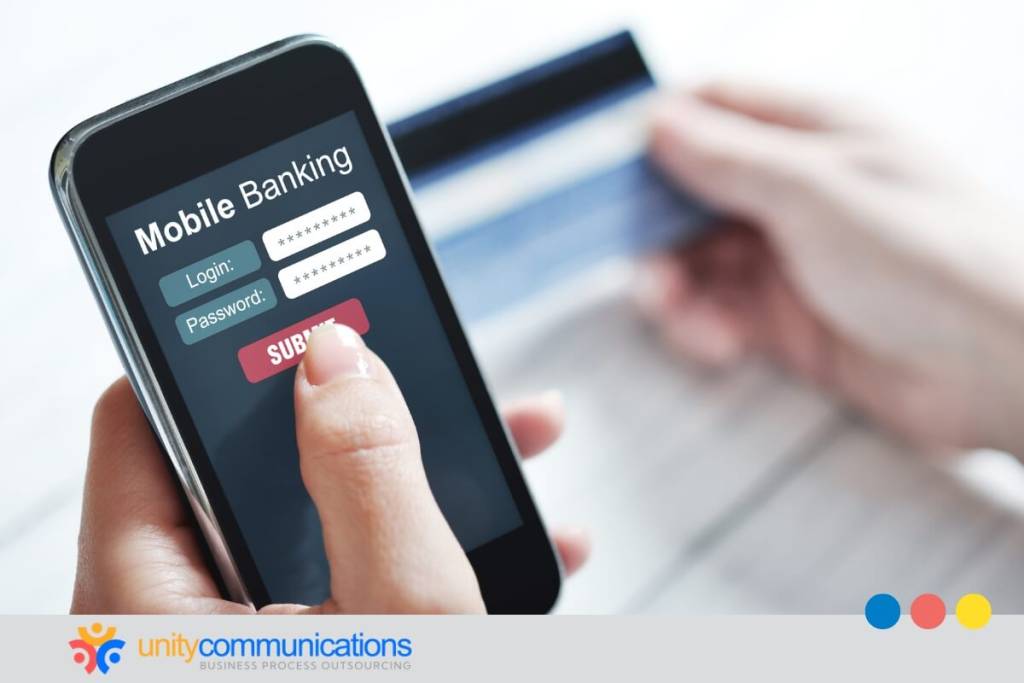IN THIS ARTICLE
Table of Contents
Groundbreaking innovations in business process outsourcing (BPO) and financial technology (fintech) supercharge mobile banking services. BPO vendors provide the strategic flexibility and technological expertise to transform mobile banking and pave the way for personalized, secure, and convenient banking solutions.
Continue reading to learn about fintech BPO innovations that revolutionize mobile banking services.
BPO as a pillar of modern mobile banking

What is a BPO, and why do financial institutions rely on this innovative approach to boost their mobile banking services? BPO is the strategy of delegating specific business processes to service providers. The benefits of outsourcing in finance are wide-ranging.
Leveraging third-party expertise and resources streamlines operations and optimizes costs. Banks can outsource non-core functions such as customer service and back-office operations to focus on their primary financial services and strategic growth.
Specialized BPO firms boost modern mobile banking solutions through their expertise in technology development and deployment. For instance, they facilitate the integration of advanced technologies such as artificial intelligence (AI) and blockchain to enhance the features and security of mobile banking apps.
Collaborating with BPO providers speeds up the implementation of cutting-edge tools, driving innovation and competitiveness.
Below are the critical roles of BPO in mobile banking:
Enhancing UI/UX design
BPO providers use specialized skills and a user-centric approach to craft an excellent mobile banking user interface (UI) and a seamless user experience (UX).
Their expertise helps them fine-tune every aspect of UI, from navigation to aesthetics, to meet user needs and drive satisfaction and engagement. Providers prioritize accessibility and intuitive design to convert mobile banking apps from mere tools to personalized and indispensable companions for users.
Integrating mobile banking features seamlessly
BPO companies seamlessly add essential functionalities to mobile banking apps. Their role extends beyond mere implementation. It also includes meticulously planning and executing strategies to provide users with easy mobile payments, hassle-free account management, and real-time notifications.
Prioritizing optimal performance and UX helps design reliable features and enhances the banking platform’s usability and convenience. BPO companies also uphold strict attention to detail and a commitment to maintaining a cohesive UX.
Adopting emerging technologies
BPO firms are revolutionizing mobile banking services by adopting emerging technologies. They are leading the way in enhancing security, automating customer service with AI-driven chatbots, and personalizing banking experiences.
AI-powered analytics offer invaluable insights into customer behavior, allowing banks to tailor services to individual needs. Meanwhile, blockchain technology promotes secure, transparent transactions, positioning banks at the forefront of technological advancement.
The strategic integration of BPO innovation in mobile banking enhances service efficiency and security. It also results in a more personalized and seamless banking experience for customers.
Strategic BPO partnerships and their market impact

BPO partnerships transform global markets, offering companies ways to streamline operations while focusing on growth. With specialized BPO services, businesses can drive innovation, reduce costs, and maintain a competitive edge.
The following section discusses how BPO can boost different aspects of mobile banking operations.
Improving UX in mobile banking services
UX is critical in mobile banking, where ease of use and intuitive features can improve customer satisfaction. Banks can significantly enhance their digital offerings, such as financial management and risk management services, by outsourcing app development, navigation improvements, and features such as wallet integration.
- Simplify app navigation with a clean, intuitive interface. A well-organized, user-friendly interface ensures customers can easily find and use essential banking features without confusion, enhancing overall user satisfaction.
- Offer seamless wallet integration. Integrating digital wallets into the mobile banking app allows customers to make quick and secure transactions without repeatedly entering payment details.
- Incorporate biometric authentication. Adding biometric login options, such as fingerprint or facial recognition, provides an extra layer of security while maintaining a frictionless UX.
- Enable personalized features. Offering tailored insights, such as spending analytics and budget tracking, based on a user’s financial behavior helps customers manage their money more effectively and keeps them engaged with the app.
- Ensure quick load times and minimal downtime. Fast and reliable performance prevents user frustration, ensuring customers can access their accounts and complete transactions without delays.
- Implement multi-language support. Language options make the app more inclusive, catering to diverse customer bases and ensuring ease of use for non-native speakers.
- Provide real-time customer support via chat or voice assistants. Offering immediate assistance through AI-driven chatbots or voice assistants ensures that customers can resolve issues or get help anytime needed.
Enhancing UX through these strategies leads to increased customer retention and loyalty.
Impacting mobile banking security
BPO firms strengthen the security infrastructure of mobile banking services. By integrating innovative technologies and proactive risk management, they safeguard sensitive data while maintaining regulatory compliance. These partnerships allow financial institutions to stay ahead of evolving cyber threats without compromising UX.
- Implement AI-driven threat detection. Using AI algorithms, BPO firms can monitor banking systems in real time, detecting potential cyber threats early and taking immediate action to prevent breaches.
- Utilize blockchain technology. Blockchain provides a decentralized, tamper-proof ledger for banking transactions, increasing security and transparency while reducing the risk of fraud.
- Enforce geolocation-based security. By tracking the geographical location of user logins, geolocation-based security ensures that access is only granted from trusted regions and blocks suspicious activity.
- Deploy cloud-based disaster recovery solutions. Cloud-based disaster recovery systems enable quick data backups and restorations in case of a breach or system failure, minimizing downtime and data loss.
- Ensure compliance with global data protection regulations. BPO providers ensure mobile banking services meet data protection standards such as the General Data Protection Regulation (GDPR) and the Payment Card Industry Data Security Standard (PCI DSS), safeguarding user privacy and avoiding regulatory penalties.
- Implement multi-factor authentication (MFA). MFA strengthens security by requiring users to verify their identity with two or more methods, such as a password and a one-time code, making it harder for unauthorized individuals to access accounts.
- Integrate encryption protocols. End-to-end encryption ensures that all data transferred between users and banking systems is securely encoded, protecting sensitive information from being intercepted or compromised during transactions.
By leveraging these strategies, BPO partnerships help financial institutions maintain a robust and adaptive security framework, ensuring long-term customer trust.
Expanding customer experience
Enhancing customer experience in mobile banking goes beyond simple transactions, focusing on tailored interactions and efficient support. The BPO partner can integrate personalized features and AI-driven chatbots, allowing banks to deliver seamless service and address customer needs in real time. This boosts satisfaction and promotes long-term customer loyalty.
- Use AI-powered chatbots. AI-driven chatbots provide immediate, round-the-clock assistance, resolving common customer inquiries or issues without human intervention, enhancing convenience and satisfaction.
- Personalize banking recommendations. Tailored banking suggestions, such as customized loan offers or savings tips and return on investment (ROI) calculation, are generated based on users’ financial behavior, making the experience more relevant and engaging.
- Enable proactive notifications. Automated alerts keep customers informed about essential account activities such as balance updates, bill reminders, and transaction alerts, helping them manage their finances efficiently and avoid missed payments.
- Provide self-service options. Self-service features such as fund transfers, account updates, and card management allow users to handle routine banking tasks independently, enhancing convenience and reducing reliance on support.
- Integrate multi-channel communication. Offering multiple communication channels such as chat, email, and phone support ensures users can switch between different support methods without losing context, improving the overall service experience.
- Leverage data analytics for personalized insights. Advanced data analytics can track and analyze user behavior, providing personalized insights such as budgeting advice, expense tracking, and customized financial goals, creating a more engaging and valuable experience.
- Implement voice recognition technology. Voice-enabled banking allows customers to access their accounts, check balances, and make transactions through voice commands, providing a convenient, hands-free way to manage finances.
Implementing these strategies strengthens customer relationships and ensures a more engaging, responsive banking experience.
Real-world applications of BPO innovations in mobile banking services
The following are real-world examples of innovations that enhance the functionality and usability of mobile banking applications:
- A leading bank partnered with a prominent technology services provider to revamp its mobile banking app. The tech company implemented advanced analytics and AI-driven features for a more personalized and user-friendly interface. This collaboration significantly enhanced overall customer engagement and satisfaction.
- A prominent bank partnered with a leading consulting firm to enhance its mobile banking platform. The consulting firm’s contributions included integrating AI-powered virtual assistants and advanced security protocols. The partnership improved the usability and safety of the mobile banking experience.
- A significant financial institution worked with a prominent technology services company to upgrade its mobile banking application. The provider focused on enhancing the UI/UX design and incorporating real-time financial management tools. The upgrades made the app more intuitive and efficient, allowing users to manage their finances seamlessly.
Strategic BPO partnerships can drive innovation in mobile banking, leading to enhanced functionality, improved user experiences, and greater customer satisfaction.
Forecasting the future of BPO and mobile banking
The partnership between banks and BPO companies will continue to shape the future of mobile banking. How outsourcing works is that it will adopt more technological advancements and push the boundaries of what is possible. This way, mobile banking will remain relevant.
- AI-powered personalization. BPO partnerships will use advanced AI algorithms to analyze customer data to anticipate individual needs and customize product recommendations, financial advice, and proactive solutions. This capability enhances customer satisfaction and engagement with mobile banking platforms.
- Enhanced security measures. Partnerships will focus on securing transactions and protecting sensitive customer information from unauthorized access through blockchain technology. Biometric authentication will become a standard in identity verification and fraud prevention.
- Integration of emerging technologies. Augmented reality (AR) and virtual reality (VR) applications will revolutionize how customers interact with their finances. The Internet of Things (IoT) will allow access to banking services from interconnected gadgets.
- Expansion of digital ecosystems. BPO partnerships will expand digital ecosystems to offer a comprehensive suite of financial services beyond traditional banking. Integration with third-party fintech solutions will enable customers to access insurance, investment, and wealth management services seamlessly through their mobile devices.
- Emphasis on sustainability and ESG. As environmental, social, and governance (ESG) concerns become more important, mobile banking platforms will be more sustainable. Green investments and eco-friendly banking products will empower customers to align their financial decisions with their values.
The collaboration between banks and BPO firms drives innovation in mobile banking and creates a more secure, personalized, and sustainable financial landscape for customers.
Long-term implications of BPO innovations in mobile banking services

The long-term implications of BPO innovations in mobile banking services will profoundly affect consumer behavior, banking regulations, and the broader fintech ecosystem.
Consumer behavior
These BPO innovations in mobile banking services will fundamentally reshape consumer behavior through a shift toward digital-first banking experiences. As mobile banking platforms become more intuitive, personalized, and convenient, consumers will increasingly rely on their smartphones for a wide range of financial activities.
This mobile banking trend leads to higher adoption rates of banking services across demographic groups, including tech-savvy Gen Z and older generations.
Banking regulations
Rapid technological innovation in mobile banking will require updates to existing banking regulations to promote consumer protection, data privacy, and financial stability. Regulators must balance fostering innovation and safeguarding against cybersecurity threats, data breaches, and algorithmic bias.
Regulatory frameworks governing BPO in financial technology, data sharing, and digital identity verification will evolve to accommodate the changing landscape of mobile banking services.
Fintech ecosystem
The convergence of banking and fintech, driven by BPO partnerships, will grow the broader fintech ecosystem, creating new opportunities for collaboration and competition.
Fintech startups will play an increasingly prominent role in driving innovation within mobile banking, developing niche solutions and disruptive technologies that challenge traditional banking models. Established banks will embrace open banking principles and strategic partnerships with fintech firms to harness their expertise and expand their digital offerings.
These BPO innovations in mobile banking services will lead to personalized experiences, regulatory agility, and collaborative innovation in digital finance. As mobile banking evolves, banks, BPO companies, regulatory bodies, and fintech firms must adapt and collaborate to navigate the complexities of an increasingly interconnected financial landscape.
The bottom line
BPO drives innovation in mobile banking through strategic partnerships and integration of advanced technologies, such as AI and blockchain, enhancing security and user experiences. This collaboration shifts the landscape toward digital-first banking, reshaping consumer behavior and prompting regulatory adaptation.
Let’s connect to learn more about BPO innovations in mobile banking services.





